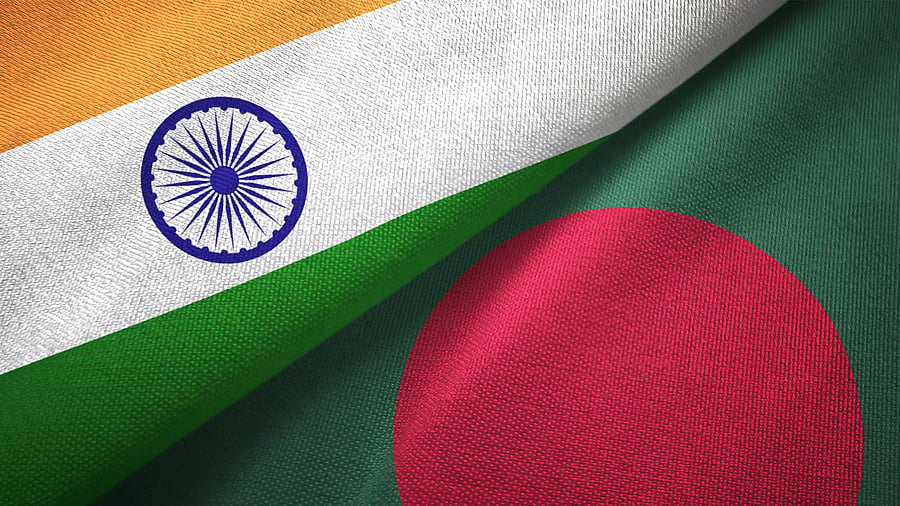
India and Bangladesh flags.
Credit: iStock Photo
Md Touhid Hossain, foreign adviser to the interim government of Bangladesh, has now acknowledged that there have been attacks on minority communities in Bangladesh but castigated the Indian mainstream and social media for propagating exaggerated or false narratives on the incidents. Hossain argued that the first step towards improving the bilateral ties would be putting an end to the killing of unarmed civilians at the border.
There has been heightened tension along the border since the new regime took over in Bangladesh last year. Increasing incidents of illegal construction, border crossing, and firing have been reported. Statistics widely quoted in Bangladesh claim that 25 Bangladeshi nationals were killed in 2024.
According to the BSF, it apprehended 2,294 Bangladeshi nationals on the border while they were attempting to infiltrate into Indian territory. In 2024, as many as 69 BSF personnel were injured in attacks by armed men, smugglers and other criminals along the border, while in 2023, the number of injured personnel was 74.
Problems over management of the Indo-Bangladesh land border arose within months of Bangladesh’s independence in 1971. Today, the border represents both a symbol of the strained relationship between the two countries and a major obstacle to its improvement. Rapid deterioration in the bilateral relations in the years preceding 2005 can be largely attributed to the unstable security situation on the border. Periodic occurrence of unpleasant incidents on the border, including civilian deaths and injuries at the hands of the security forces, mostly by the BSF, is a reality and has a disproportionate psychological impact on the Bangladeshis.
The deaths of Bangladeshi nationals on the border are perceived in Bangladesh as indiscriminate killings of innocent, unarmed civilians by an unsympathetic entity, in violation of domestic and international laws. Such incidents are also perceived as arrogant action by a stronger neighbour. India feels that instead of terming the border fatalities “killings”, they should be classified as “deaths” since they are not intentional. Moreover, all Bangladeshi nationals who have died in BSF firing were found in Indian territory.
Influenced by the wars with China and Pakistan over unsettled borders, the Indian mindset has been shaped by the imperative to ensure territorial integrity by securing borders, irrespective of the costs involved. Border friction between India and Bangladesh is essentially the result of paucity of resources and economic disparities. This is borne out by assertions of former Pakistani prime minister Zulfikar Ali Bhutto and Bangladesh’s founding father Sheikh Mujibur Rahman, laying claims to the Indian state of Assam with its abundant resources to overcome paucity of land in East Pakistan and to make it financially and economically strong.
Two nations, two approaches
Based on these existential considerations, Bangladesh views border management issues more from a humanistic and benign perspective, tacitly disregarding harsh measures to counter smuggling and illegal border crossings. The current conceptions being adopted in border management by both countries are at variance. While India follows a more security-oriented philosophy, disregarding public sentiment, Bangladesh espouses a milder approach based on ground realities.
Most of the outstanding border issues are not directly territorial but of access to resources and livelihood. As a result, disputes that do not involve territorial claims but are resource-based have a better chance of being managed. Both countries need to deconflict their border-guarding approaches and apply humanitarian principles where appropriate. For this, the focus should shift to the people, which include the security personnel, the locals, as well as the migrants who are stakeholders in effective border management.
While Bangladesh needs to impose tighter controls to address Indian concerns, India needs to tone down its excessive security-centric approach by striking a balance between its security concerns and welfare of the people residing in the border region. The notion of a hard border needs to be relatively de-emphasised, to make a workable compromise between functionality, security and territoriality.
Failures in border management, including the occurrence of violent clashes involving the forces, demand an integrated border management regime at the national level and a harmonised, joint border management policy between the two countries. Both India and Bangladesh will have to develop mechanisms that ensure that security concerns do not result in strained relations. Devising these mechanisms is going to be an arduous task. Border management, if refined based on peoples’ aspirations and current dynamics, is one facet that can change perceptions of the common masses in Bangladesh towards India. This is where border management becomes an essential adjunct to policy formulation for achieving a sustainable Indo-Bangladesh bilateral relationship.
(The writer is a former Vice Chief of the Indian Army)